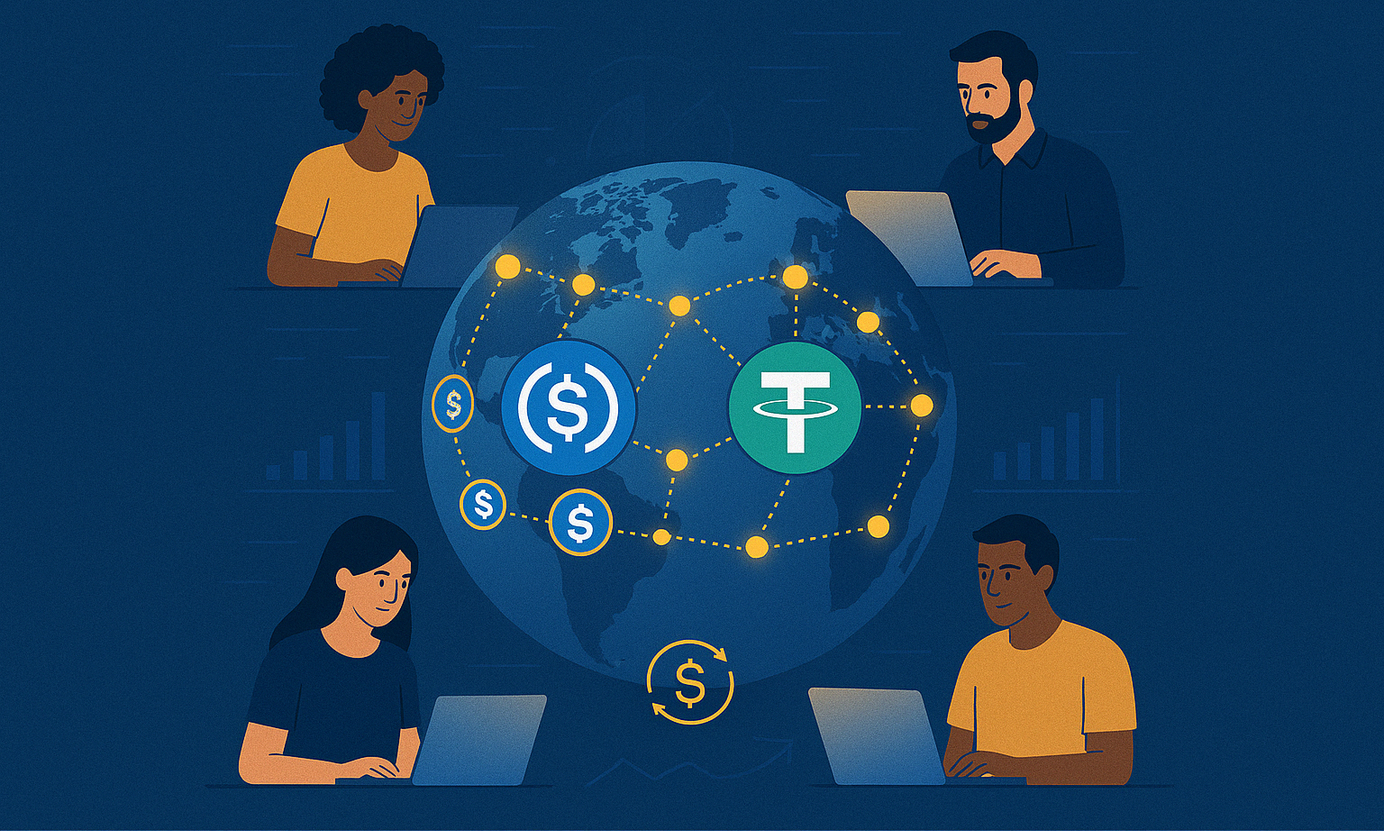
Efficiently Hiring Workers in Brazil with Bitwage
Learn how hiring in Mexico can benefit your business and how Bitwage simplifies payroll to workers in Mexico.
Table of Contents
Introduction
Brazil has quickly emerged as one of the most attractive markets for hiring remote workers. With its vast talent pool, competitive labor costs, and strong cultural and time zone alignment with North America, it's no surprise that many companies are turning to Brazil for their staffing needs. Brazil offers a diverse range of professionals eager to work for international companies, from skilled developers and designers to customer support specialists and project managers.
However, while hiring in Brazil comes with numerous advantages, one of the most significant challenges remains: how to pay Brazilian workers efficiently and cost-effectively. Traditional payroll solutions are often bogged down by high fees, complex currency conversions, and delayed payments, making it difficult for employers to manage payroll efficiently.
This is where Bitwage comes in. Bitwage simplifies the process of paying remote workers in Brazil by offering fast, transparent, and low-cost payment solutions. Whether you're paying in Brazilian Real (BRL), or even cryptocurrency, Bitwage ensures your workers get paid quickly and securely, without the headaches.
In this guide, we'll explore why Brazil is a great choice for remote hiring and how Bitwage takes care of the payment process, allowing you to focus on growing your business.
Why Hire in Brazil?
Rich Talent Pool
Brazil is home to one of the largest and most diverse talent pools in Latin America. Whether you're looking for software developers, digital marketers, or customer service representatives, you'll find skilled professionals with the expertise to help your business thrive. Brazilian workers are particularly strong in tech fields, with a growing number of developers proficient in popular programming languages like Java, Python, and JavaScript.
In addition to tech talent, Brazil is known for its highly creative workforce, with professionals excelling in design, marketing, and content creation. The country's educational system, which focuses on science, technology, and engineering, produces top-tier graduates each year, making it an ideal destination for global businesses looking to expand their teams.
Cost Efficiency
One of the most attractive aspects of hiring in Brazil is the significant cost savings compared to other hiring destinations, like the United States or Western Europe. Salaries in Brazil are generally lower than in many developed countries, while the quality of work remains high. Companies can access highly skilled professionals at a fraction of the cost, giving them a competitive edge in terms of both pricing and output.
For businesses looking to stretch their budget, hiring in Brazil allows you to get more value from every dollar spent. This is especially beneficial for startups and small businesses that need to maximize their resources without sacrificing quality.
Time Zone Alignment
Brazil's time zones are well-aligned with North American businesses, particularly those in the U.S. and Canada. With most of the country operating within just a few hours of Eastern and Central time zones, communication with remote workers in Brazil is smooth and real-time collaboration is feasible.
This time zone advantage makes Brazil an excellent choice for companies that need fast response times and the ability to work during regular business hours, without the delays that come from hiring workers in more distant countries.
Growing Freelancer Market
Brazil is experiencing a significant rise in freelance and remote work, with many professionals seeking international clients and projects. This trend is particularly strong in the tech industry, where Brazilian developers are in high demand for global software development and IT projects. As more Brazilian workers embrace the flexibility of freelancing, companies have access to a vast pool of independent talent that can be hired on a project basis or as part-time team members.
With the global shift toward remote work, hiring Brazilian freelancers is easier than ever, and many of them are already equipped with the tools and experience needed to work seamlessly with international clients.
Legal Considerations When Hiring in Brazil
Employment Models: Contractors vs. Employees
When hiring in Brazil, companies need to decide whether they want to hire workers as contractors or employees. The decision affects both the legal and financial obligations for employers.
- Contractors: Hiring workers as independent contractors can be more straightforward for international companies. Contractors are not subject to the same labor laws as employees, meaning there are fewer legal requirements around benefits and taxes. This is an ideal solution for companies looking for more flexibility or needing workers on a project basis.
- Employees: If a worker is hired as an employee, the company is required to follow Brazil's labor laws, which include providing benefits such as health insurance, paid vacation, and contributions to Brazil's social security system (INSS). This can be more costly and complex, especially for companies operating outside Brazil, but it may be necessary if the worker will have an ongoing role within your organization.
Many companies opt to work with contractors to avoid the complications of Brazilian labor laws, especially for remote positions that don't require long-term employment.
Tax Implications
Brazil has a complex tax system, and both employers and workers must comply with various tax obligations. For companies hiring workers in Brazil, it's important to be aware of these:
- Payroll Taxes: Employers must contribute to social security (INSS) and other mandatory benefits if hiring employees. These taxes can add up to around 30% of the employee’s salary.
- Value Added Tax (VAT): Brazil imposes a VAT on goods and services (ICMS), which may affect companies importing products or services into the country.
- Withholding Taxes: For contractors, the employer may be required to withhold taxes from payments depending on the contract type and the worker's tax residency status.
Contracts and Documentation
Clear contracts and agreements are essential when hiring remote workers in Brazil. Regardless of whether you're hiring as a contractor or employee, it's crucial to outline the terms of the work arrangement, including payment terms, duration, scope of work, and other details. This helps protect both parties and ensures that expectations are aligned.
For contractors, a service agreement is typically used, while for employees, an employment contract is required under Brazilian labor laws. In both cases, ensure that the contract clearly outlines:
- Payment terms (currency, schedule, method)
- Responsibilities and deliverables
- Termination clauses and notice periods
- Confidentiality and intellectual property rights
By using clear and thorough documentation, you can avoid misunderstandings and ensure smooth cooperation.
Challenges of Paying Workers in Brazil
Currency Conversion and Exchange Rates
One of the primary challenges when paying workers in Brazil is dealing with currency conversion. Most companies pay in USD or other foreign currencies, but Brazilian workers need to receive payments in Brazilian Real (BRL). This process involves converting currencies, which can lead to significant exchange rate fluctuations and additional fees.
Traditional payment methods, such as wire transfers or global payroll providers, often impose high conversion rates, which means workers may receive less than expected due to unfavorable exchange rates or hidden fees.
How Bitwage Solves This: Bitwage allows employers to pay workers directly in local currency or cryptocurrency, eliminating the need for expensive currency conversions. Our platform ensures that workers receive the exact amount they’re entitled to, without worrying about fluctuating exchange rates or high conversion fees while letting employees choose which currency or mix of currencies they want to get paid in.
High Transaction Costs
Sending funds from the U.S. or other countries to Brazil often incurs bank fees and wire transfer charges, which can add up quickly. These costs typically fall on the employer, but in some cases, the workers may be forced to cover the fees.
Moreover, financial institutions in Brazil charge high transaction fees for receiving international payments, which cuts into the worker’s earnings. This can be a serious pain point for employers trying to pay workers efficiently.
How Bitwage Solves This: Bitwage offers low transaction fees, ensuring that both employers and workers benefit from cost savings. By paying in cryptocurrency, Bitwage helps employers save on unnecessary banking fees. Our platform makes it easy to pay workers at a low cost, ensuring a transparent process where both parties get the most out of every transaction.
Payment Delays
Another common issue when paying workers in Brazil is payment delays. Traditional international payments can take several business days (sometimes even up to a week) to clear, especially when processed through banks or global payroll systems. This delay can disrupt workers’ financial planning and lead to frustration.
For companies paying multiple international contractors or employees, managing these delays across time zones and currencies becomes even more challenging. With payment delays, companies also risk missing deadlines and compromising worker satisfaction.
How Bitwage Solves This: Bitwage is designed to speed up payments, ensuring that workers receive their funds promptly. Payments can be completed within a few hours, depending on the payment method chosen (e.g., Bitcoin or bank transfers), and there are no unnecessary delays.
How Bitwage Solves Payment Challenges
Simplified Payments in BRL or Crypto
One of the biggest hurdles to paying workers in Brazil is the need for local currency—the Brazilian Real (BRL)—and the complexity of currency exchange. Bitwage offers direct payments in BRL, so employers can pay Brazilian workers in their local currency without worrying about the hassle of currency conversions or high conversion fees.
Moreover, for companies looking to pay workers in cryptocurrency, Bitwage also supports crypto payments. This is an excellent option for businesses that deal with cryptocurrencies or wish to pay in digital currencies like Bitcoin or stablecoins.
Low Fees and Transparency
Traditional banking and payroll providers often come with high transaction fees that eat into both the employer's and the worker's earnings. Bitwage, however, offers low, transparent fees with no hidden charges. Employers are aware of the exact cost of each transaction upfront, and workers receive their payments in full, without deductions for excessive banking fees.
The simplicity and transparency of Bitwage's fee structure ensure that employers and employees alike can trust the process. Companies can save money while workers enjoy full, timely payments.
Non-Custodial Model for Security
Bitwage operates with a non-custodial model, meaning that the platform does not hold any of the funds being transferred. Instead, Bitwage acts as a facilitator, helping employers send payments to workers securely without ever storing the money. This ensures that neither the employer nor the employee has to worry about the safety of their funds being compromised on a third-party platform.
In a time when security is a top concern, Bitwage offers a peace of mind that other centralized systems cannot. Employees maintain full control over their funds, and employers can trust that their transactions will be processed securely and quickly.
Conclusion
Hiring and paying workers in Brazil doesn’t have to be complex or costly. With Bitwage, businesses can streamline their payroll processes, eliminate currency conversion headaches, reduce transaction fees, and ensure timely payments. Whether you're paying a few contractors or building a full team in Brazil, Bitwage provides a reliable, flexible, and cost-effective solution to make international payroll seamless.
Get started with Bitwage today and take the first step towards simplifying your global payroll.










